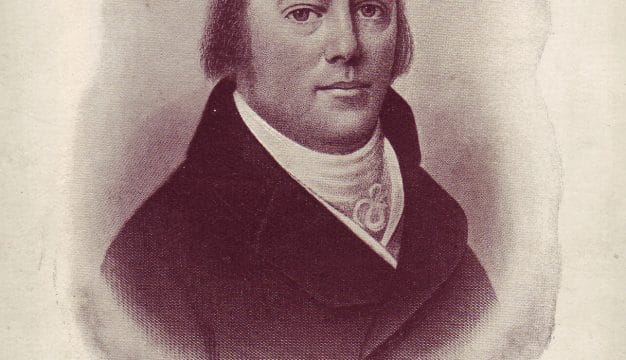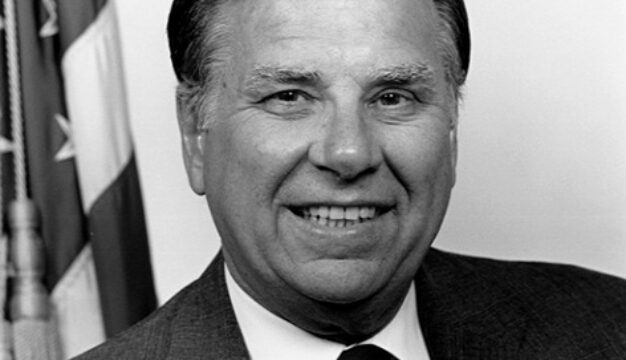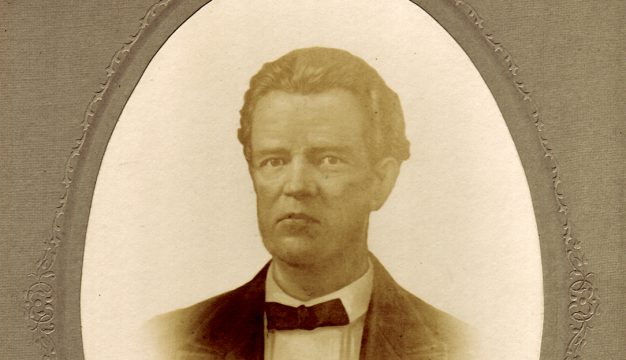George Paul Harrison Jr.
George Paul Harrison Jr. (1841-1922) was a prominent Alabama politician in the late nineteenth century who represented Alabama’s Third Congressional District in the U.S. Congress. A veteran of the American Civil War, he rose to the rank of general in the Confederate Army. Later, he became a plantation owner and a lawyer and was heavily involved in Democratic Party politics. He was a member of the Alabama State Senate and served as a delegate to the 1875 and 1901 state constitutional conventions, which enacted regressive and white supremacist policies, respectively.
Harrison Jr. was born at Monteith Plantation outside of Savannah, Georgia, on March 19, 1841, to George Paul Harrison, a wealthy rice planter, and Thursa Adelaide Harrison. He had three sisters. Harrison Sr. was a member of the Georgia House of Representatives for nine years. Harrison Jr. was 19 years old, and a student at the Georgia Military Institute, when he enlisted in the First Georgia Regulars in January 1861 as Georgians were debating and heading toward secession. He was made a second lieutenant, and his father was made a brigadier general in the state militia thanks to his influence and friendship with Georgia governor Joseph E. Brown.
With the militia, Harrison Jr. participated in seizing Fort Pulaski from the Federal government on January 3, 1861, which occurred prior to Georgia’s January 19 declaration of secession. By May 1862, Harrison Jr. had become colonel of the Fifth Georgia Infantry Regiment before it was disbanded. He was then given command of the Thirty-second Georgia Infantry Regiment, which was stationed near Charleston, South Carolina, for the next two years. The 32nd Georgia defended against the U.S. Army’s July 18 assault on Battery Wagner, helping to repulse the famed attack by the 54th Massachusetts Infantry, the first African American volunteer regiment to serve in the U.S. Army. During his service in Charleston, Harrison Jr. was wounded twice. In 1863, he married Mary F. Drake, with whom he would have one child who died in infancy. The following year, Harrison Jr. led a brigade during the Confederate victory at Olustee, in north-central Florida. The largest battle fought in the state, the engagement resulted in more than 2,000 combined casualties and featured several U.S. Army regiments consisting of freedmen and U.S. Colored Troops. Wounded during the engagement, Harrison received a citation for his courage. In addition, he was promoted to brigadier general at age 23. He spent the remainder of the war in the Carolinas. Harrison commanded a prison camp in Florence, South Carolina, where he was known for his humane treatment of Federal prisoners. In 1865, Harrison Jr. led a brigade at the Battle of Bentonville, North Carolina, in April 1865, a Confederate defeat. Also present were future Alabama politicians Edmund W. Pettus and Joseph Wheeler. Harrison surrendered to Federal troops under the command of Maj. Gen. William T. Sherman at Greensboro, North Carolina, on April 26, 1865, along with the entirety of Confederate general Joseph E. Johnston’s command.
Harrison studied law and at some point, relocated to Auburn in present-day Lee County. He quickly garnered a reputation as an accomplished lawyer, while also managing a plantation. Harrison became an active figure in local politics. Displeased with the racially progressive changes in the 1868 Constitution created during Reconstruction, Harrison was a part of a coalition that helped write the Alabama Constitution of 1875 after the Democratic Party re-obtained political power in the state. The convention minimized both the size of the state government and the influence of freedmen in Alabama politics. Many of the delegates, like Harrison, were lawyers and Confederate veterans. The 1875 Constitution did not openly disenfranchise anyone, but it removed progressive Reconstruction policies enacted in the 1868 Constitution. The people of Alabama ratified the constitution on November 16, 1875.
Harrison served in Alabama’s State Senate from 1878-84 and as Senate president from 1882-84. After leaving office, he was a delegate to the 1892 Democratic National Convention, which successfully nominated Grover Cleveland for a second term in office. Harrison continued his law practice, and he worked as counsel for the Central of Georgia Railway and the Western Railway of Alabama. In 1886, he married Mattie Clopton Ligon, a daughter of Robert Fulwood Ligon, who had represented Alabama in the U.S. Congress and as its lieutenant governor. The couple would have one child who died at a young age like Harrison’s first child.
In 1894, Harrison was elected to the 53rd Congress to fill the vacancy of William C. Oates, a lawyer and former Confederate colonel who won Alabama’s gubernatorial election. The Third Congressional District encompassed Barbour, Bullock, Coffee, Dale, Geneva, Henry, Lee, and Russell Counties at that time. Harrison joined a House of Representatives with the Democrats as the majority party.
Harrison served in Congress until 1897. During his time in the House, the country was in a depression following the Panic of 1893 and the New York Stock Exchange crash. Utah was admitted as a state during his tenure, as was the creation of the Tea Importation Act of 1897, which was a major piece of legislation meant to curb impure and harmful teas from entering American markets. Harrison left office on March 3, 1897, and was replaced by Democrat Henry D. Clayton Jr.
After leaving Washington, D.C., Harrison returned to practicing law in an office in Opelika. Harrison was reelected to the Alabama State Senate in 1901, serving until 1902. During this time, he was again a state constitutional convention delegate, this time in 1901, representing the 27th Senatorial District for Lee and Russell Counties. The new constitution enacted voting restrictions that disenfranchised most Black men and many poor white men. In his later years, Harrison Jr. was a leader of the Alabama Division of the United Confederate Veterans organization and a freemason. His married his third wife, Sara Katherine Nunnaly, in 1901, and would have one child.
Harrison died in Opelika on July 17, 1922, at the age of 81 and was interred in the city’s Rosemere Cemetery.
Further Reading
- Allardice, Bruce S. More General in Gray. Baton Rouge: LSU Press, 2006.
- Eicher, John, and David Eicher. Civil War High Commands. Redwood City, Calif..: Stanford University Press, 2002.
- Jones, C. C. Southern Historical Society Papers: Volumes 35-37. Richmond: Virginia Historical Society, 1907.






